By Margarita Skacenko
My Career Transition
When I quit my job and life in Chile and settled back in France, I thought it was the perfect time to make a career transition into the fashion industry. But when life opens doors for you, this gift comes with doubts about yourself and fear about your future.
I graduated with a master’s in International Relations and EU Cooperation Projects Management from the University of Strasbourg in 2018 and worked for about 4 years in this field. So it was something totally unrelated to fashion. Luckily, back in 2022, I was a student of the Break into the Fashion Industry course for 1 year and Giada Graziano’s career advice made me more open-minded and motivated to land a job in fashion with no prior experience in the industry.
I had several options in mind:
- Get a job in my field or any flexible remote job while doing a part-time fashion internship on the side so I can support myself financially and gather experience in the industry.
- Or move to Paris, the French capital of fashion, and find a full-time job in fashion there.
I ended up taking a social media management course in the summer of 2022 so I could work as a manager for fashion companies or bloggers and thus gain experience in the industry. In addition, it would give me the stability and time to figure out my future career plans in fashion.
By the time I finished the course, I soon received a weekly e-mail from Glam Observer, where Giada said she was hiring a fashion editorial assistant. It was a lucky coincidence to find everything I was looking for in a job offer: a job in fashion, remote, in editorial, and on top of that it was with my mentor Giada. It was the definition of a dream fashion job. I applied and got the role, and have been working here ever since 🙂
As many of you, my fashion enthusiast friends dream of breaking into the fashion industry but you are currently working in another field, I thought my story would help you understand how to make a career transition.
Before we start, please note that my tips will be more helpful for those who already have experience in another industry. If you are a student or recent graduate and you have never worked before, (in any industry) you need to start with fashion internships. So you should read this article instead. Also, if you are a doctor, a chemist, or a civil engineer, I won’t lie to you saying you can easily break into the fashion industry as you don’t have much knowledge and skills that can be easily transferrable, like in marketing, journalism, etc. If this is your case, I recommend starting with a fashion internship.
As to other fellow professionals – international relations specialists like me, marketing managers, linguists, lawyers, economists…, – I invite you to finally discover how to transition from another industry to fashion.
How To Make A Career Transition To The Fashion Industry
Let’s start with some FAQs that many people have when they decide to break into fashion with no previous experience in the industry.
Do I need to do a fashion internship to work in the industry?
Internships are the ideal solution if you are a total beginner with no experience. But if you already have some – even if it’s not in fashion – you are not considered a beginner, so you can skip the internship and save yourself some precious time.
Do I need to study again if I want to switch industries/careers?
Usually, when you want to find a job in fashion but you don’t have a fashion degree, the first thought is to enroll in a fashion school or get another generic bachelor’s or master’s degree in your field of interest.
Let me be frank. I believe in life-long learning, but I don’t like the idea of endless studies. First of all, you already possess more skills than you think, and secondly, what you don’t know yet, you can study in a short course.
Don’t get me wrong: a second or third high education degree gives you new knowledge and skills. What’s more, it can be required especially for very specific roles like fashion lawyers who cannot exercise as such without a formal degree in law, or fashion designers who usually attend a fashion school to learn how to design clothes (although there are many famous fashion designers who didn’t study fashion).
However, the majority of the careers teach you skills that are more flexible in bridging the gap between your current experience and your desired career in fashion. You can transfer skills between different industries (for example, a marketing manager can work as much in a software startup as a fashion company) and closely related roles (for instance, you can easily move from marketing to PR). They are called “transferrable skills”.
How to apply transferable skills to get a job in fashion?
Transferable skills are abilities you have gained in previous roles, personal experiences, or education that can be applied to different industries or positions, including fashion.
You might be convinced fashion companies are only looking for fashion school graduates, but this is a huge myth! The fashion industry is looking for a diverse range of talents and expertise, with all kinds of skills. Engineers, psychologists, art historians…everyone is welcome.
Transferrable skills are great because they can provide a solid foundation upon which you can build and thrive throughout your career path in the fashion industry. They allow you to showcase your potential and suitability for a new role, making you a versatile candidate, capable of landing a role even if it’s unrelated to what you studied or what your previous position was.
The first thing you need to do when you prepare for a career transition to the fashion industry is to analyze all the tasks and responsibilities you had in the past, and the skills you have acquired, and transfer them to the fashion industry.
Determine your transferrable skills
Scenario 1: You apply for the same role but in the fashion industry
If you like your current role but just want to switch industries, in this case, fashion, it’s the easiest option and you are almost all set.
This is how your transition will look like depending on the role:
Law – Fashion Law
Marketing – Fashion Marketing
PR – Fashion PR
You see the idea.
It doesn’t matter if you work as a PR in the sports industry or fashion, or as a journalist at a newspaper or a fashion magazine; what matters most is that you know how to write a press release or an article. Sure, each industry and company has its specificities and you’ll need to gain some additional knowledge to learn about them, but when you graduate you are prepared to do this job in any field. Therefore, your transition into the fashion industry will be smooth as you are already equipped with the required hard skills.
However, I suggest you read the job description to understand if you need previous experience in the fashion industry. For some companies it’s a must, for others, it’s preferable (aka optional) and others don’t mention anything about it.
That being said, when you apply for a fashion job, be prepared to answer the question “Why do you want to work in fashion” as recruiters will want to know why you want to switch industries. You will be expected to demonstrate a good knowledge of the fashion/luxury sector and your passion for the industry. As I said in the beginning, studying fashion is not necessary, but reading fashion news and taking some short online courses is a must. You can find many great sources in our article “Where to learn about fashion”.
Scenario 2: You want to switch careers
At some point in our lives, we realize we no longer want to do the same job. There are political scientists who aspire to become fashion buyers. Engineers who want to become fashion designers. And so on.
If like me you woke up one day and decided to work in fashion, I admire your courage and want to assure you it’s totally possible to pursue your dream. Compared to the first scenario, it can be harder to understand how to do it, so I will focus a bit more on switching from one career to another.
Let’s take my example when I worked in International Relations. My main responsibilities and strengths were project management, organizing events, and writing reports and content for the websites. On the top of my mind, I could have become a fashion project manager, an international partnerships coordinator, a fashion event producer, or a fashion PR. But I chose writing because this is my big passion.
Let’s see other examples.
If you have a background in business, economics, or finances, consider you won the lottery as working in these fields has taught you skills that will be useful if you want to work on the business side of the industry.
Industry outsiders often think that if you work in fashion, you have to be necessarily someone creative. Truth is, the industry also needs people with a mindset and background in business who can help run the companies. Therefore, a degree in business, economics, or similar will be a good fit for roles such as buying, merchandising, or brand management, as they are number-oriented and require solid analytical skills and knowledge of Excel.
You can also use your background in linguistics or translation to work in fashion.
Languages are one of the most useful skills to work in fashion. I speak 5 and I see it as an advantage that opens many career possibilities.
With communication and writing skills, you can aim for a career in fashion communication, and PR, or become a fashion editor or writer.
In addition, fashion jobs that require working with international stakeholders and involve occasional traveling, such as fashion buying, merchandising, and PR, also seek candidates who can speak several foreign languages.
You can learn more about transferable skills and how to leverage them in this article.
Don’t underestimate the power of soft skills.
Soft skills are your golden ticket to working in fashion. There are two main reasons for this.
First, while hard skills can be learned, personal traits are harder or take longer to change so if you have them that’s very good.
Second, one specific thing about the fashion industry is that it’s very competitive and dynamic, so you need to be passionate, hard-working, and fast. These qualities will get you through hard working days and keep you motivated.
During my experience as an International Relations Coordinator, I developed invaluable soft skills, such as organizational skills (a must-have in any fashion job), interpersonal skills, a sense of tact and diplomacy (contrary to what fashion movies suggest, the industry doesn’t like rude people 😉 ), problem-solving, analytical mindset, attention to detail, and many others.
Make your fashion job a side hustle
It can be difficult to pivot your career in a 180° in a short time, and there is no need to. Despite it’s possible to transition from another industry to fashion, you are still new in this world, and it takes some time to find a new job, plus you don’t want to lose your main source of income.
If you struggle to find a full-time job in fashion, or one you like, consider taking a part-time fashion job on the side of your main job.
These are some examples of fashion careers that you can do remotely with a flexible working schedule, so you can juggle several jobs easier.
- Fashion Writer
- Social media manager of fashion-related accounts
- Fashion E-commerce
- Online stylist
You can also become a Sales assistant as this is one of the easiest jobs to find. Keep in mind thought that this position will be more useful for a future career in retail and fashion buying.
It doesn’t mean your part-time fashion job has to be the same as your next career adventure. But if you have already identified your dream role in fashion, it would be wise to find a side hustle in that specific field.
However, if you are undecided between several careers, any experience in the industry will be valuable for your career growth. This way you don’t put your fashion dreams on hold and you can break into the industry sooner than you thought possible.
How to apply for fashion jobs when you have a different background
Build a resume focused on the skills
When you are making a career transition, you might think you have nothing to add to your resume because your education and experience are irrelevant to the fashion industry. But this is not true. As we saw earlier, you can transfer the skills you acquired at university and previous jobs to the fashion industry. And the CV is the place to showcase those skills.
There are many different ways to build a resume, and my favorite strategy is to make it focused on the skills.
You should have a section called “Skills”. You can even put it on the top of the page before the education and experience sections to make it stand out and draw attention to the skills aka your strengths instead of your work experience, which at first sight can be considered unrelated to fashion, especially if you don’t explain it well.
Your work experience section should contain bullet points under each previous job where you can briefly explain what your responsibilities were and most importantly – which skills you developed under those roles. If you just list your previous work experiences without giving these details, it’s likely the recruiter won’t understand how it’s connected to the role you are applying for.
For example, this is what I wrote on my CV when I had no experience in fashion.

We explain more about how to write a CV for fashion in this article.
Express your motivation to work in fashion in a cover letter
When you switch industries, what fashion companies want to know besides your previous work experiences and skills is your motivation to work in fashion and not another industry. This is why I strongly recommend including a cover letter in your application – whether it’s requested or not – to express your motivation.
To give you an example, in my fashion cover letter, I said that my interests and values lay more in the fashion industry rather than diplomacy, and I found that my personality and the environment I saw myself in matched more with the fashion world.
You should also find and state your personal reasons for working in fashion. Avoid saying banal/generic things like “I have been dreaming of working in fashion since I was a kid”. Instead, ask yourself what is it that attracts you to the fashion industry, and why this specific career makes you enthusiastic.
In this article, you can get more cover letter tips.
Build your fashion portfolio
A fashion portfolio is a good way to compensate for your lack of experience in the fashion industry where you can showcase your skills and talents.
If you want to become a fashion editor, stylist, designer, event organizer… I am sure you already have some knowledge and skills required for these roles, otherwise, you wouldn’t consider them. Yes, you may lack deep knowledge and some specific skills, but your passion and transferable skills are for sure a good foundation.
If you want to become a fashion designer, your portfolio can include sketches you did even in your spare time.
A portfolio of an aspiring fashion editor can include sample articles you keep on your desktop and looks you styled with your friends or drawings of looks inspired by the style of your favorite celebrity.
And so on.
A portfolio is a must-have for creative roles and a nice to have for all the others. So I recommend sending it even when companies don’t expressly request it.
In Giada’s online course Break into the Fashion Industry, she explains step-by-step how to build a portfolio for every career in fashion.
I hope that after reading this article, a career transition to the fashion industry looks less scary to you. Don’t feel intimidated by your lack of experience in fashion, or the fact that you don’t have a fashion degree, because you don’t necessarily need them. As an experienced professional – even if you are a beginner – you already have what it takes to transfer your knowledge, skills, and passion to the fashion industry.
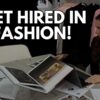
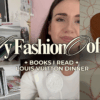

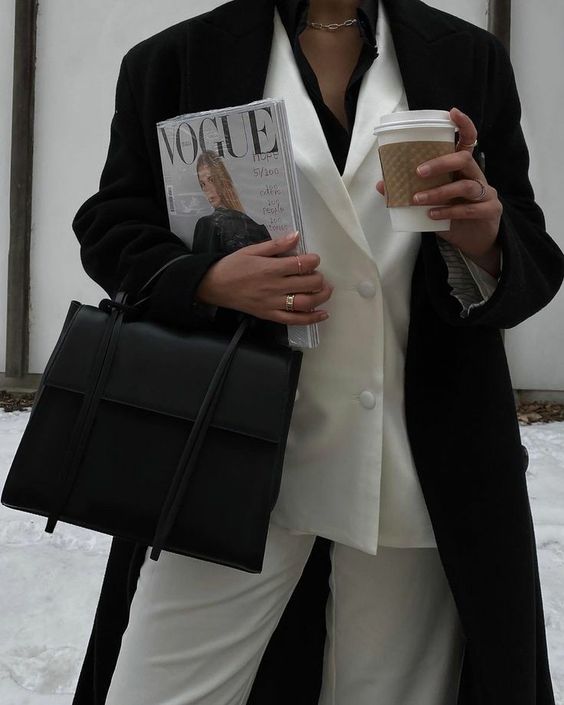

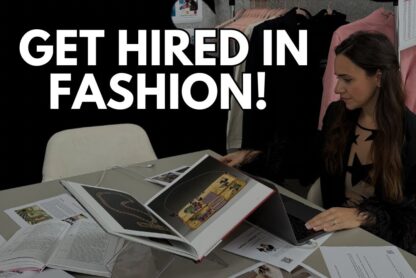
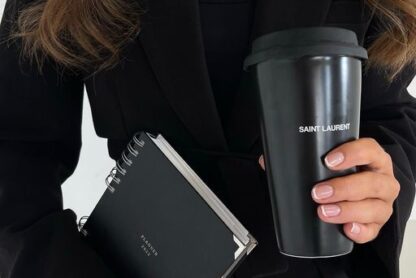
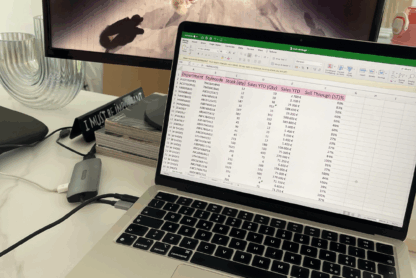
I am very relieved after reading this article as I was having a mind block. I have been meaning to resume in to fashion industry since 4 years, as well as have graduated in Fashion since 4 years too.
This article has given me motivation and a direction to kick start my career. Thank you.
Will keep you updated 🙂